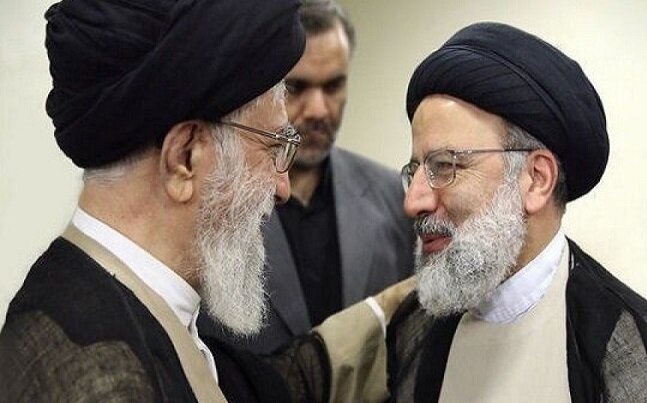Ebrahim Raisi, the former head of the Astan Quds Razavi religious foundation, with Iran’s Supreme Leader (File)
UPDATED, JAN 16:
The Trump Administration, in a sanctions spree against Iran in its last week in office, has added companies in the Islamic Republic, China, and the United Arab Emirates to the blacklist.
The firms were named for allegedly contributing to conventional arms proliferation through business with the Islamic Republic of Iran Shipping Lines and three Iranian entities.
The seven companies include Iran’s Marine Industries Organization, Aerospace Industries Organization, and Aviation Industries Organization; Chinese-based Jiangyin Mascot Special Steel; and UAE-based Accenture Building Materials.
The State Department said firms can be sanctioned if they transfer any of 15 materials used in Iran’s nuclear, military, or ballistic missile programmes. The banned products include certain types of aluminium and steel.
Foreign Minister Mohammad Javad Zarif did not specifically respond to the sanctions, but he fired a final derisory tweet at the Trump Administration.
The damage Trump regime has done to humankind is not enough for its extremists
In its last disgraceful days, designating Houthis to worsen humanitarian nightmare & warmongering lies against Iran by Pompeo show utter contempt for peace
The planet will be better off without them.
— Javad Zarif (@JZarif) January 15, 2021
ORIGINAL ENTRY, JAN 14: The Trump Administration, departing office in a week, has sanctioned Iran’s wealthiest religious foundation.
On Thursday the Treasury blacklisted Astan Quds Razavi, the manager of the holy shrine of the 8th Shia Imam, Reza, in Iran’s second city Mashhad.
The long-time head of Astan Quds Razavi was Ebrahim Raisi, now head of Iran’s judiciary and a Presidential candidate in 2017.
The Treasury also sanctioned the State organization Execution of Imam Khomeini’s Order.
The sanctions freeze the assets of the leaders and subsidiaries of the foundations. Anyone who engages in transactions with the sanctioned entities may also be punished.
US Secretary of State Mike Pompeo claimed, “EIKO and AQR control large portions of the Iranian economy, including assets seized from political dissidents and religious minorities, for the benefit of Supreme Leader Ali Khamenei, his office, and senior Iranian government officials.”
Treasury Secretary Steven Mnuchin added, “These institutions enable Iran’s elite to sustain a corrupt system of ownership over large parts of Iran’s economy. The United States will continue to target those who enrich themselves while claiming to help the Iranian people.”
The Trump Administration imposed comprehensive sanctions on Iran in November 2018, six months after withdrawing from the 2015 nuclear deal between Tehran and the 5+1 Powers (US, UK, France, Germany, Russia, and China). It has extended the blacklist since then, with a significant escalation in recent months.
Last month the Treasury sanctioned the Al-Mustafa International University, a network of religious seminaries with branches in 50 countries, claiming that it has recruited Afghan and Pakistani students to fight in the Syrian conflict.
See also US Sanctions Put Spotlight on Iran’s Religious Seminaries and Involvement in Syria
Iran Currency Sinks as Trump Administration Expands Sanctions on Financial Sector
In October, the Administration extended sanctions on Iran’s financial sector, including the Central Bank, feeding a record drop in Iran’s currency. The rial fell more than 50% since March to reach about 315,000:1 v. the US dollar before recovering with the prospect of a Biden Administration.
On Thursday, the rial is at 240,000:1.


Rial continues to strengthen against the dollar: https://www.bonbast.com/
“On Thursday the Treasury blacklisted Astan Quds Razavi, the manager of the holy shrine of the 8th Shia Imam, Reza, in Iran’s second city Mashhad.”
imam reza will have to find another way to manage finance of his jendeh khouneh(brothels) outside iri.